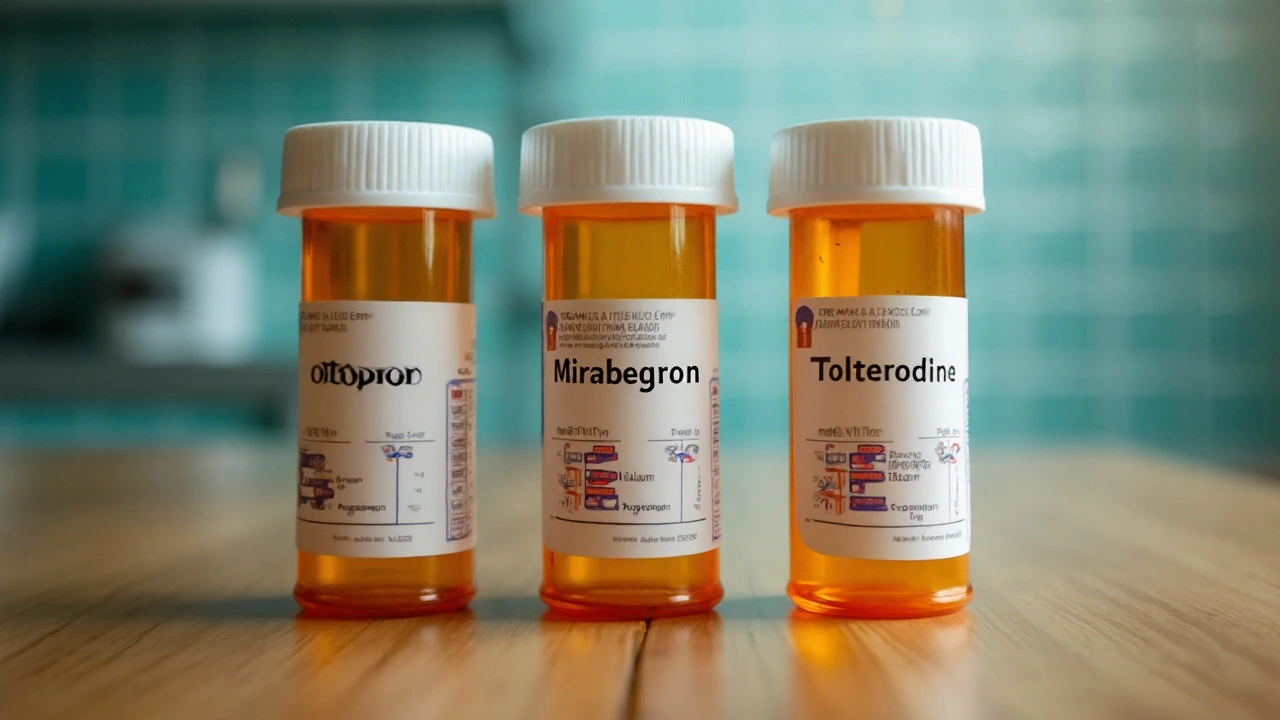Ditropan (Oxybutynin) vs Alternatives: Find the Best Overactive Bladder Medicine

Overactive Bladder Medication Selector
1. Do you experience severe dry mouth with antimuscarinics?
2. How important is convenient dosing for you?
3. Any history of glaucoma or urinary retention?
4. Are you concerned about elevated blood pressure?
5. Do you prefer a non-anticholinergic option?
Your Recommended Medication:
Ditropan (Oxybutynin) is a antimuscarinic that relieves symptoms of overactive bladder by relaxing the bladder's detrusor muscle.
What Is Overactive Bladder?
Overactive bladder (OAB) is a syndrome marked by sudden urges to urinate, frequent daytime trips, and nighttime awakenings. The International Continence Society estimates that around 12% of adults in the UK experience OAB symptoms that affect quality of life. The condition arises when the bladder muscle contracts involuntarily, a process that antimuscarinic drugs aim to suppress.
How Does Oxybutynin Work?
Oxybutynin blocks the muscarinic M3 receptors in the bladder wall, decreasing involuntary contractions. By inhibiting acetylcholine signaling, the drug reduces urgency episodes and increases bladder capacity. Clinical trials published in 2022 showed a 30% reduction in daily urge episodes for most users, but the benefit can be offset by dry mouth, constipation, and blurred vision.
Key Alternatives on the Market
When doctors prescribe an antimuscarinic for OAB, they often consider several options beyond oxybutynin. Below are the most widely used alternatives, each introduced with its essential attributes.
Tolterodine is a selective antimuscarinic that targets bladder receptors while sparing salivary glands, lowering dry‑mouth risk.
Solifenacin is a long‑acting antimuscarinic that offers once‑daily dosing and a relatively gentle side‑effect profile.
Darifenacin is a M3‑selective antimuscarinic that focuses on bladder receptors, reducing systemic side effects.
Fesoterodine is a pro‑drug antimuscarinic that converts to an active form in the gut, allowing flexible dose titration.
Trospium is a quaternary antimuscarinic that does not cross the blood‑brain barrier, limiting cognitive side effects.
Mirabegron is a β3‑adrenergic agonist that relaxes the bladder muscle via a different pathway, making it a non‑anticholinergic option.

Side‑Effect Profiles at a Glance
All antimuscarinics share a core set of side effects-dry mouth, constipation, and blurred vision-but the frequency and severity differ. Mirabegron avoids those typical cholinergic complaints but can raise blood pressure in a minority of patients.
| Drug | Mechanism | Typical Dose (UK) | Common Side Effects | Average Monthly Cost (GBP) |
|---|---|---|---|---|
| Oxybutynin | Non‑selective antimuscarinic (M1‑M3) | 5mg oral 2‑3×/day or 5mg transdermal patch daily | Dry mouth, constipation, blurred vision | ~£8 |
| Tolterodine | Selective M2/M3 antagonist | 2mg oral once‑daily (extended‑release) | Dry mouth (less), dizziness | ~£12 |
| Solifenacin | Long‑acting M3 antagonist | 5mg oral once‑daily (can increase to 10mg) | Dry mouth, constipation (moderate) | ~£15 |
| Darifenacin | M3‑selective antagonist | 7.5mg oral once‑daily | Dry mouth (low), constipation | ~£18 |
| Fesoterodine | Pro‑drug converted to active 5‑hydroxy‑oxybutynin | 4mg oral once‑daily (flexible up to 8mg) | Dry mouth, headache | ~£20 |
| Trospium | Quaternary antimuscarinic (M1‑M3) | 20mg oral twice‑daily | Dry mouth (less), urinary retention (rare) | ~£10 |
| Mirabegron | β3‑adrenergic agonist | 25mg oral once‑daily (can increase to 50mg) | Elevated blood pressure, nasopharyngitis | ~£30 |
Choosing the Right Medication for You
Picking a drug isn’t just about numbers; it’s about how the medication fits into your life. Consider the following decision points:
- Side‑effect tolerance: If dry mouth is a deal‑breaker, trospium or mirabegron may be better.
- Dosing convenience: Once‑daily options (solifenacin, mirabegron, extended‑release tolterodine) boost adherence.
- Cost constraints: Generic oxybutynin is the cheapest, but insurance coverage can make a pricier drug more affordable.
- Comorbidities: Patients with glaucoma should avoid antimuscarinics; those with hypertension need caution with mirabegron.
- Age and cognition: Trospium’s limited CNS penetration makes it a go‑to for older adults prone to confusion.
Discuss these factors with your GP or urologist. In many UK clinics, a step‑wise approach is used: start with a low‑dose antimuscarinic, monitor response, then switch or add mirabegron if symptoms persist.
Practical Tips for Managing OAB While on Medication
Even the best drug won’t solve OAB alone. Pair pharmacotherapy with lifestyle tweaks for optimal control:
- Track fluid intake. Aim for 1.5-2L per day, spreading it evenly.
- Limit bladder irritants-caffeine, alcohol, spicy foods.
- Practice timed voiding: start with every 90minutes, gradually extend intervals.
- Pelvic floor exercises (Kegels) strengthen the sphincter, reducing urgency.
- If you experience dry mouth, sip water, chew sugar‑free gum, or use saliva substitutes.
Related Concepts and Next Steps
Understanding OAB opens doors to broader topics. Two closely linked areas are:
- Behavioral bladder training - a non‑drug strategy that reshapes voiding patterns.
- Pelvic floor physiotherapy - hands‑on therapy that can improve muscle coordination.
Future articles might explore the evidence behind neuromodulation devices or the role of diet in bladder health. For now, decide whether a traditional antimuscarinic like Ditropan alternatives or a newer class such as mirabegron fits your goals, then schedule a review after four weeks to assess efficacy.

Frequently Asked Questions
Can I switch from oxybutynin to another antimuscarinic without a washout period?
Most clinicians advise a brief overlap of 24-48hours to prevent a gap in symptom control. Because all the drugs share a similar safety profile, a formal washout isn’t usually required, but you should discuss timing with your prescriber.
Why does oxybutynin cause such strong dry mouth?
Oxybutynin blocks muscarinic receptors not only in the bladder but also in salivary glands. The reduced acetylcholine signaling cuts saliva production, leading to the characteristic dry‑mouth sensation.
Is mirabegron safe for people with high blood pressure?
Mirabegron can raise systolic pressure by a few mmHg in about 5% of patients. If you already have hypertension, your doctor may monitor blood pressure closely or choose a lower starting dose.
Do generic versions of these drugs work as well as the brand‑named ones?
Regulatory agencies require generics to demonstrate bio‑equivalence, meaning they deliver the same active ingredient at the same rate. Clinical experience shows no meaningful difference in efficacy, though some patients notice a change in side‑effect intensity.
How long should I try a medication before deciding it’s not working?
Give any OAB drug at least four weeks at a therapeutic dose. If urgency episodes haven’t dropped by roughly 30% or quality‑of‑life scores remain low, discuss dosage adjustment or switching with your clinician.
Can I use over‑the‑counter supplements instead of prescription drugs?
Some supplements like pumpkin seed extract show modest benefit, but they lack robust trial data. They may be used adjunctively, but prescription antimuscarinics or mirabegron remain the most evidence‑based options for significant symptom control.






Comments
Justin Valois
September 25, 2025 AT 15:19Listen up, folks, the battle over bladder meds is real and we gotta defind our freedoom from the pharma giants who wanna push the most expensive pills while ignoring real life side effects. This ain't just a medical thing, it's a cultural war over who gets to control our bodies.
Jessica Simpson
September 29, 2025 AT 02:39While the article lays out the options nicely, it's worth noting that in Canada we also see regional formularies that favour certain brand names, which can make a big difference for patients on a fixed income. A little cultural context helps to understand why some folks might shy away from oxybutynin despite its low cost.
Ryan Smith
October 2, 2025 AT 13:59Oh great, another pill to hide behind.
John Carruth
October 6, 2025 AT 01:19Hey everyone, let’s take a step back and look at the bigger picture when choosing an overactive bladder medication.
First, we all know that adherence drops dramatically when dosing schedules are inconvenient, so once‑daily options like solifenacin or mirabegron have a real advantage.
Second, the side‑effect profile is not just a footnote; dry mouth can lead to dental problems and affect nutrition, especially in older adults.
Third, cost is a huge factor in the UK and US; while generic oxybutynin is cheap, insurance formularies often push patients toward pricier brand drugs.
Fourth, comorbidities such as glaucoma or hypertension must shape the decision, because antimuscarinics can worsen intra‑ocular pressure and some β3‑agonists can raise blood pressure.
Fifth, cognitive safety matters – trospium’s limited CNS penetration makes it a safer bet for seniors at risk of confusion.
Sixth, there’s emerging evidence that combination therapy of low‑dose antimuscarinic plus mirabegron can synergistically improve symptom control without dramatically increasing side effects.
Seventh, patient education on lifestyle modifications-fluid management, bladder training, and pelvic floor exercises-remains the backbone of any pharmacologic plan.
Eighth, clinicians should schedule a follow‑up at four weeks to assess efficacy and tolerability, adjusting dose or switching agents as needed.
Ninth, we shouldn’t ignore the psychological burden of OAB; anxiety can amplify urgency, creating a vicious cycle.
Tenth, shared decision‑making empowers patients, helping them weigh convenience, cost, and side‑effects according to personal priorities.
Eleventh, researchers are currently exploring new targets like selective M3 antagonists that promise fewer systemic effects.
Twelfth, real‑world data suggest that adherence rates improve when patients perceive they have a voice in the prescription process.
Thirteenth, it’s also worth noting that some patients report better outcomes with extended‑release formulations that smooth out peak plasma levels.
Fourteenth, in practice, a stepwise approach-starting low, titrating slowly, and considering a switch only after an adequate trial-minimizes risk.
Finally, keep an eye on emerging guidelines, as the therapeutic landscape continues to evolve with novel agents on the horizon.
Melodi Young
October 9, 2025 AT 12:39Honestly, the long‑winded rundown in the previous comment hits most of the key points-but you could’ve cut it down to a paragraph. People don’t have time to read an essay when they’re just looking for a quick answer on which pill to try.
Tanna Dunlap
October 12, 2025 AT 23:59It’s morally reprehensible that pharmaceutical companies continue to market drugs with nasty side effects while cloaking them in glossy brochures. Patients deserve transparency, not a barrage of marketing fluff.
Troy Freund
October 16, 2025 AT 11:19While I agree that the industry could be more honest, we also have to remember that many of these medicines genuinely improve quality of life. A balanced view acknowledges both the good and the bad.
Mauricio Banvard
October 19, 2025 AT 22:39What they don't tell you is that the big pharma lobby has been secretly funding research to keep antimuscarinics on the market, while quietly suppressing data on newer, safer agents. Stay woke, folks.
Paul Hughes
October 23, 2025 AT 09:59Interesting take, but remember that the best choice often boils down to personal tolerance-some people can handle dry mouth, others can’t. :)
Mary Latham
October 26, 2025 AT 20:19i think people are overreacting about dry mouth, its not a big deal if u drink water and chew gum. also, most of these meds work fine for me.
Emily Stangel
October 30, 2025 AT 07:39From a clinical perspective, it is imperative to conduct a thorough assessment of the patient's comorbid conditions, medication history, and lifestyle factors before initiating any antimuscarinic therapy. The decision matrix should incorporate pharmacokinetic considerations, such as hepatic metabolism and renal clearance, to mitigate the risk of drug accumulation. Moreover, the clinician must evaluate the potential for drug‑drug interactions, particularly with agents that possess anticholinergic burden. In practice, initiating therapy with a low‑dose extended‑release formulation can enhance tolerability while still achieving therapeutic efficacy. Follow‑up appointments should be scheduled at regular intervals to monitor symptom improvement and adverse events. Patient education regarding fluid intake, bladder training, and pelvic floor strengthening exercises remains a cornerstone of comprehensive management. Ultimately, shared decision‑making fosters adherence and aligns treatment goals with patient preferences.
Suzi Dronzek
November 2, 2025 AT 18:59The previous explanation, while thorough, borders on preaching to the choir. It fails to address the underlying ethical issue of prescribing expensive brand‑name drugs when generics are available and equally effective.
Aakash Jadhav
November 6, 2025 AT 06:19In the grand theater of existence, one might ask: is the urgency to urinate a mere physical symptom, or a metaphor for the restless soul seeking liberation? The bladder becomes a stage upon which our anxieties perform their restless dance.
Amanda Seech
November 9, 2025 AT 17:39That's a cool way to think about it, but really you just need a drug that works, no deep philosophy needed.
Lisa Collie
November 13, 2025 AT 04:59Excuse me, but you're oversimplifying a complex pharmacologic landscape. Only a truly informed elite can navigate the nuances between M3 selectivity and β3‑adrenergic agonism.
Soumen Bhowmic
November 16, 2025 AT 16:19I respectfully disagree with the elitist tone; the priority should be patient empowerment, not gatekeeping knowledge behind a veil of superiority.